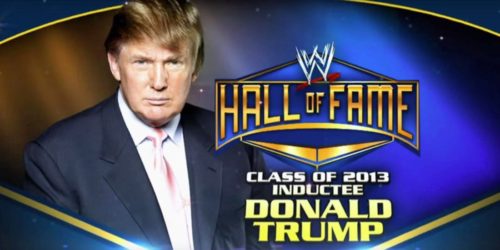“Donald Trump looks and sounds like a professional wrestling character.” People say this figuratively, but they should mean it literally. He looks and sounds like a professional wrestling character because he is one. In fact, the WWE elected him to its Hall of Fame in 2013. His wrestling character isn’t the whole story of Trumpism, but it’s a major part.
Let’s explore that, shall we?
Notes on ‘Character’
We’re used to thinking about character in a more cerebral, moralistic way. Politicians have moral values, and they employ those moral values when they serve in office. As for Donald Trump? Yes, he has certain values, however misguided they might be, and those values impact the Trumpist program.
But that’s not what I have in mind here by ‘character’. I’m talking about the character Trump plays on television, in other media, and in person. First and foremost, Trump is a performer. Never forget that, and never talk about Trump or Trumpism without that fact stored away.
Performativity
People say Trump’s behavior is ‘performative’, but that term doesn’t mean what they think it means. Calling something ‘performative’ is inert, useless. Every politician, indeed every person, employs performativity in the things they say and do. All the term points to is the fact that people do things with their words. Well, of course they do, and all of us do it every day. People use ‘performative’ and ‘performativity’ in a conspiratorial tone, with the hint of impropriety ever present. This simply doesn’t work. The word picks out a banal commonplace.
‘Performativity’ traces to the philosopher J.L. Austin, who used it to make a technical point in the philosophy of language. He pointed out that statements of a certain sort – those beginning with phrases like ‘I order…’ or ‘I promise…’ or even ‘I know…’ – aren’t merely true or false statements. When we utter them, we also perform an action. When we say, for example, ‘I promise to take out the trash’, we perform the action of promising to take out the trash.
That’s the stuff, but it’s not the end of what Austin says. By the end of his lectures, Austin concluded that there’s nothing special about promises. Nearly everything else we say also doubles as an action. Even statements about, for example, basic facts, the location of an object, or the presence of a feeling. When stating thing like these, we perform the action of informing someone, explaining something, or expressing something.
And so, it’s performativity all the way down! To suggest something inherently improper about performativity is to condemn everyone. To strip language of performatives is to strip it completely. And to strip our politicians of performatives is to strip us of politicians.
Hmmm. Maybe that last one’s not such a bad thing?
The Character of Donald Trump
Barack Obama played a character on TV. He was the cool, steady-handed leader. We could trust him. He had a great education, for one. He built careers in both community activism and constitutional law, working both inside and outside the system. Obama wrote and delivered profound speeches, weaving together his uniquely American background into a greater whole.
Donald Trump, too, plays a character on TV. What a different one it is from Obama’s! One difference is a matter of degree. Trump presses political boundaries much harder than Obama did, though Obama did it, too. But there’s a second difference of kind rather than degree. That’s the more interesting one. Trump’s character is one many people don’t recognize as a president. The difference of kind is the one we see as his major impact. No one’s quite sure exactly what this difference amounts to, but we sense it’s there.
Maybe it’s his means of communication. He bypasses official channels, goes directly to the public via Twitter, sets policy and hires and fires people over social media, etc. Maybe it’s his rhetoric. While presidents often played on anti-immigrant or racist sentiment, Trump does it openly and explicitly in ways we rarely see. While presidents engage in corrupt deal-making many times over, only Trump does it so openly and explicitly he gets impeached for it. And maybe it’s his campaign methods. Other presidents campaign during campaign season and then serve in office. Trump never stopped doing it.
Donald Trump, The Apprentice, and Professional Wrestling
Most people get this, but their grasp on it remains nascent. They point to, say, Trump’s time as a reality TV host on The Apprentice. And rightly so. On The Apprentice, he built his brand as a brash, bold businessman. Confident and in control, Trump brooked no guff from his contestants. In his administration, he reprises this character through his revolving door of officials, his Twitter firings, and his endless need to comment on every issue. No matter how petty.
Yet The Apprentice came late in the game, well after Trump was a household name in the US. Well before this, there’s a deeper, more guttural aspect to Trump. And to get at this, we have to return to wrestling. Trump had a (kayfabe) dispute with Vince McMahon in the early 2010s. Rival corporate executives, with McMahon the evil corporate archetype and Trump the populist champion, Trump defeated the cigar-chomper. In fact, he humiliated McMahon and shaved his head at the end of the match.
In light of Trump’s 2016 campaign, any of this sound familiar? This goes back much further, to the 1980s and 1990s. Trump twice hosted WrestleMania at one of his casinos. And he did so at the cultural height of wrestling. Trump not only hosted, but repeatedly inserted himself into the story. The commentators talked about him, promoters plastered his name all over the event and venue, and the wrestlers mentioned him in interviews.
It’s here where Trump started transitioning from ‘famous businessman’ to ‘identitarian, populist politician’.
